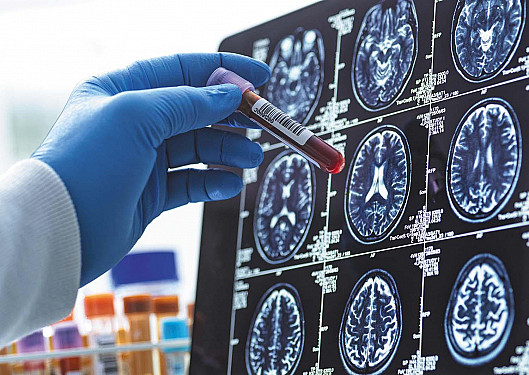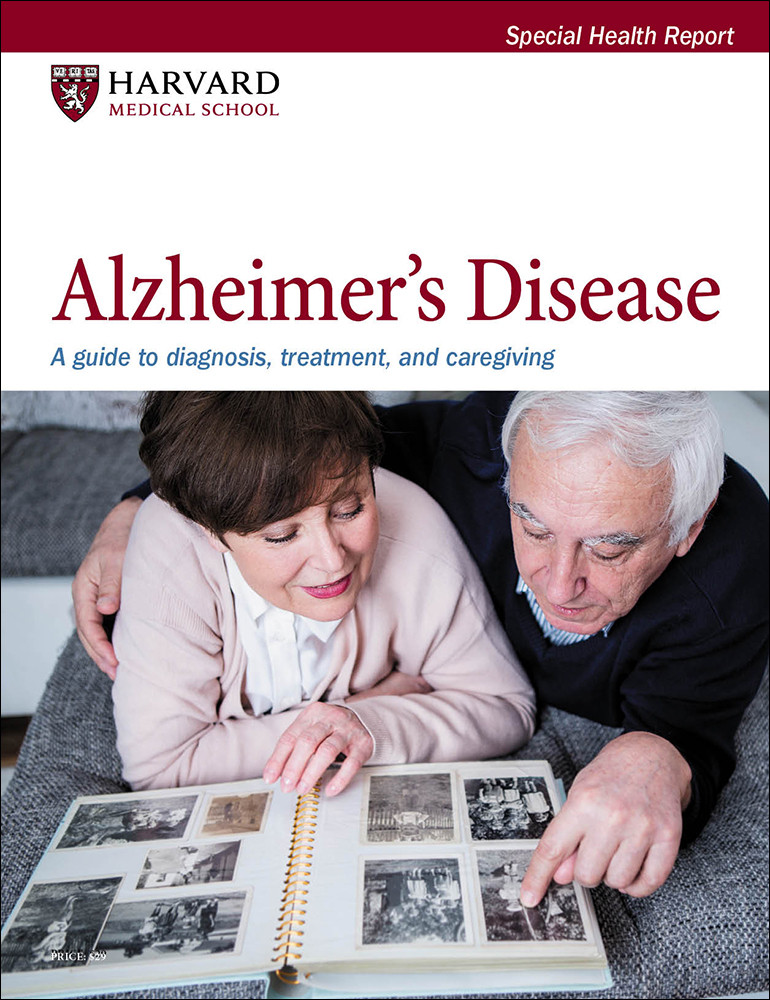Peace of mind, or panic?
More people want to know sooner if they are developing Alzheimer's. Learn the pros and cons.
- Reviewed by Toni Golen, MD, Editor in Chief, Harvard Women's Health Watch; Editorial Advisory Board Member, Harvard Health Publishing; Contributor

Even before groundbreaking Alzheimer’s disease treatments were approved over the last two years, older adults would visit neurologist Dr. Andrew Budson in deep distress over their thinking and memory problems. They knew their ability to handle day-to-day life had deteriorated, but they didn’t understand why. After doing tests, Dr. Budson would have to tell them they indeed had the incurable, degenerative condition and that it would gradually worsen.
But a strange thing often happened with this revelation: “The majority of them would leave my office happier than when they came in, because now they understood what was happening to them,” recalls Dr. Budson, a lecturer in neurology at Harvard Medical School. “I really do think most people want to know — and I’m sure more people want to know now that they’ve heard there are potential treatments.”
Although finding out your Alzheimer’s status might seem like opening Pandora’s box, a recent poll of older Americans showed that the vast majority — 79% — would want to know if they’re in the early stages of Alzheimer’s, while 91% would want a blood biomarker test to learn for certain. About 92% also said they would probably or definitely want to take a drug that could slow down the disease’s progression.
The survey findings, from 1,700 people ages 45 and older, were released by the Alzheimer’s Association on April 29, 2025. The organization also reported that for the first time, the number of people 65 and older living with Alzheimer’s in the United States has surpassed seven million — nearly two-thirds of whom are women.
But dramatic advances in testing and treatment may make people less afraid of an Alzheimer’s diagnosis than they once were, Harvard experts say.
“We used to think about Alzheimer’s as essentially a death sentence of the worst kind, where you literally lose your mind, and it can be very frightening,” Dr. Budson says. “But individuals aren’t as scared to know the truth as their families are. It can be a relief to know what’s happening to you.”
How newer treatments work
Alzheimer’s begins in the brain with deposits of a protein called beta-amyloid, which cluster together to form plaques. Over years — and sometimes decades — the plaques expand and begin to damage brain cells, Dr. Budson explains.
Another sticky protein called tau then adds to the problem, forming long chains that get tangled up in cells. “Once tangles form, they kill the cells, and that’s what causes the memory loss and other cognitive changes in Alzheimer’s,” he says.
Today’s treatments are designed to remove amyloid plaques before tau tangles get too far. The FDA approved lecanemab (Leqembi) in 2023 and donanemab (Kisunla) in 2024. Used with donepezil (Aricept) — approved in 1997 as the first Alzheimer’s drug that could improve thinking and memory in patients — the two newest medications go one step further by slowing the brain’s deterioration during the disease’s earliest stages.
Evidence shows that donanemab, for example, can slow people’s decline over 18 months by 22% to 60%, depending on how soon in the course of the disease they begin treatment. “The bottom line is, people are able to stay stable for longer when they’re taking these medications than when they’re not,” Dr. Budson says.
With the advent of these new treatments, “things don’t seem as hopeless,” says Dr. Suzanne Salamon, clinical chief of gerontology at Harvard-affiliated Beth Israel Deaconess Medical Center. “These aren’t miracle drugs, but they provide a whole new path forward.”
Streamlined diagnosis
A smoother diagnostic process is another possible reason people may be more willing to learn their Alzheimer’s status, Harvard experts say. A simple blood test called Lumipulse, approved in May 2025, may eventually replace the use of a PET scan or spinal tap (lumbar puncture) to detect the presence of amyloid plaques in the brain. “No test we’ve had is probably as accurate as a blood test,” Dr. Salamon says.
A blood test is also safer, cheaper, and less invasive and intimidating than a spinal tap, Dr. Budson notes. “And from a practical standpoint, a primary care doctor or neurologist can just order a blood test, whereas a lumbar puncture is a separate procedure that takes extra time and is uncomfortable,” he says.
Dr. Budson compares the newer process — and available therapies — to treating cancer, bolstering the case for seeking an early diagnosis. “The way I view it, when someone comes in with memory loss, it’s like they’re coming in with symptoms of a possible cancer,” he says. “We now know we can treat most cancers quite well if we catch them early. It’s the same with Alzheimer’s: we need to jump on this quickly to be able to treat it effectively.”
For a healthier brain, watch your alcohol intakeIf you’re socializing at a cocktail party and want to be able to remember the names and characteristics of people you’ve met later on, you’ll stand a much greater chance of being able to do so if you stick to nonalcoholic drinks. “In terms of the immediate effects of alcohol, there’s no doubt that it impairs people’s thinking and memory,” says Dr. Andrew Budson, a lecturer in neurology at Harvard Medical School. So it’s no surprise to him that heavy drinkers may also face far higher risks of developing brain changes linked with memory and thinking problems, according to a study published May 13, 2025, in Neurology. Researchers analyzed brain autopsies from 1,781 people (50% women) whose average age at death was 75. The autopsies looked for signs of brain injury, including tau tangles associated with Alzheimer’s disease, and hyaline arteriosclerosis, a narrowing of the small arteries that feed the brain. Family members answered questions about each deceased person’s drinking habits, and researchers compared these reports to the person’s brain state. Heavy drinkers — defined as those who drank eight or more alcoholic beverages each week — were 133% more likely to have brain changes linked to cognitive impairment than people who didn’t drink. Additionally, former heavy drinkers had 89% higher odds of similar findings. Heavy drinkers also died an average of 13 years earlier than people who didn’t drink. A standard drink equals 1.5 ounces of distilled spirits, a 12-ounce beer, or a 5-ounce glass of wine. The study was observational, meaning it couldn’t prove that heavy drinking causes brain lesions, only that an association exists. Still, “the safest thing to do is not drink,” Budson says. |
Benefits and drawbacks
To be sure, learning if you have Alzheimer’s early in the disease offers distinct pros and cons.
Pro: You can plan ahead. An early diagnosis means you have time to identify and fulfill your priorities — whether that’s to travel someplace special or plan ahead for long-term care.
“I have many patients who say, 'I was putting off taking that trip or writing my memoirs—so if I’m going to do it, I need to do it now,’” Dr. Budson says. “And some don’t want to leave the messy house they’ve lived in for 50 years for their kids to clean up. Families may want to put an addition on their house or look for assisted living facilities—there are all sorts of accommodations they can plan.”
Con: You may face stigma — or worse. A positive Alzheimer’s test on someone’s medical record could jeopardize her job or insurance coverage, Dr. Salamon notes.
Pro: You can seek support. “People are amazingly resilient,” Dr. Salamon says. “If you know what you’re dealing with, you’re often better able to cope with it. You can get therapy or go to support sessions, not just be embarrassed you’re not remembering things.”
Con: You must digest a daunting truth. “There’s no doubt that for some people, an Alzheimer’s diagnosis is very depressing and anxiety-provoking,” Dr. Budson says.
Pro: You may feel motivated to remain as healthy as possible. To maintain their body and brain health longer, people with mild cognitive impairment should do aerobic exercise, eat a healthy diet, stay socially active, get hearing aids if needed, and properly manage other chronic conditions such as high blood pressure, high cholesterol, and diabetes — “all those things that can help people live healthier lives with better memory,” Dr. Budson says. “For some, this is the wake-up call they needed.”
This article is brought to you by HarvardHealthOnline+, the trusted subscription service from Harvard Medical School. Subscribers enjoy unlimited access to our entire website, including exclusive content, tools, and features available only to members. If you're already a subscriber, you can access your library here.
Image: © DMP/Getty Images
About the Author

Maureen Salamon, Executive Editor, Harvard Women's Health Watch
About the Reviewer

Toni Golen, MD, Editor in Chief, Harvard Women's Health Watch; Editorial Advisory Board Member, Harvard Health Publishing; Contributor
Disclaimer:
As a service to our readers, Harvard Health Publishing provides access to our library of archived content. Please note the date of last review or update on all articles.
No content on this site, regardless of date, should ever be used as a substitute for direct medical advice from your doctor or other qualified clinician.
















